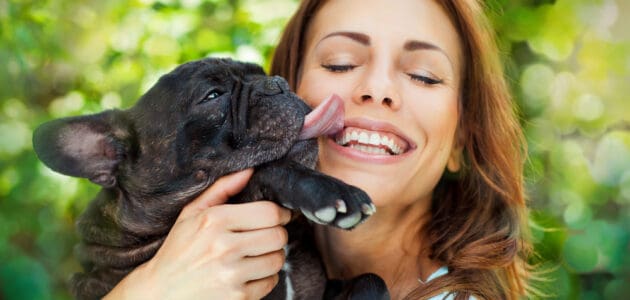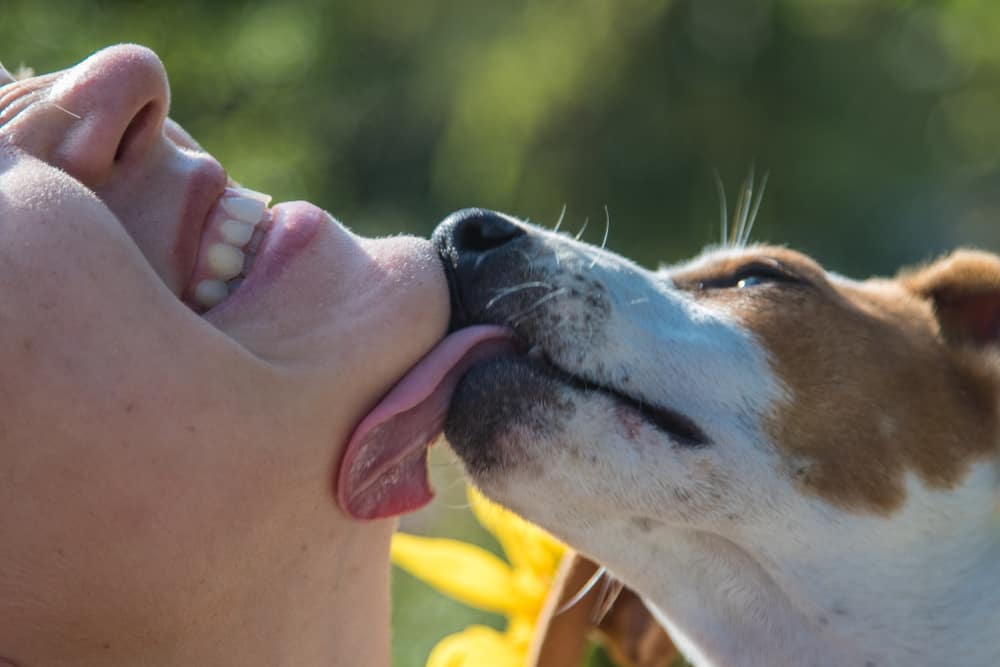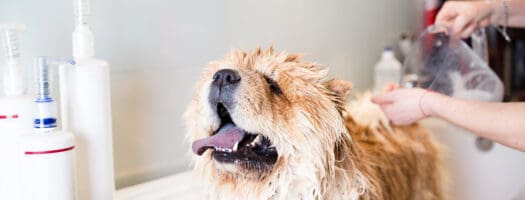Why Do Dogs Lick Your Face?

If you are a dog parent, you have probably received some dog “kisses” from your furry best friend. And while many people see this behavior as cute, others are not too thrilled with it. But why do they do it?
It turns out that dogs lick your face for many reasons, and most of them stem of evolutionary history and the pack behavior observed in wolves and wild dogs. Face-licking can mean different things, and by observing and learning your dog’s behavior, you can determine what your dog is trying to tell you.
Different Meanings of Face-Licking Behavior
Whether you are a fan of dogs licking your face or not, it is important to figure out what they are trying to communicate. Here are some common reasons for this type of behavior.
Your Dog Loves You
There is a pretty good chance your dog is licking your face because it loves you. It is a classic sign of affection and the reason why so many people call it dog “kisses.” This behavior originates from a very young age when puppies’ eyes are still closed, and the mother licks them to offer affection and a sense of security. The puppies start to associate face-licking with bonding and will continue to show love this way with anyone, including you.
Keep in mind that some dogs like to lick more than others, and if you don’t receive any “kisses,” it doesn’t mean that your furry best friend doesn’t like you. It may not prefer licking or was taught to show affection differently as a pup.
It’s Feeding Time
Wolves and wild dogs tend to hunt in the wild while their pups wait patiently for them to return. The adults then regurgitate the meat from the hunt for the young ones to feed. The puppies lick around their mother’s mouth and face, and this feeding ritual continues until they are old enough to hunt.
This behavior is embedded in your dog’s DNA, which is why it may start licking your face when it feels hungry. You will probably not regurgitate your meal, but food and treats are an even better alternative.
It’s a Way of Showing Respect
Licking plays an important role in the canine world. Besides representing bonding and affection, it can also be a sign of respect. It is a way wild dogs show submission to their pack leader. Typical wild dog behavior includes the alpha leader standing tall and proud while submissive dogs licking his face without reciprocation. And in your household, the alpha is probably you. Or at least your dog sees you as one.
Your Dog Is Grooming You
Just like cats, dogs naturally lick to clean themselves or their littermates. Your furry best friend may be looking out for you and making sure you are well-groomed.
Research has shown that canine saliva has bactericidal effects and is effective against certain pathogens. That is why maternal licking keeps puppies clean, reduces wound contamination, and protects newborns against diseases.
Dogs are good at cleaning, sometimes even a little too much. Make sure your dog is not excessively licking its wounds, as it can reopen them and cause unwanted infections.
Your Dog Thinks You Taste Great
Many people think that their dog is licking them because they are trying to get them clean. While that can be the case, your dog may actually like how you taste. Your sweat has a salty taste that many dogs enjoy, and when your canine companion is licking your face, it may be out of pure enjoyment.
It’s Doing Detective Work
Your dog is pretty good at reading your facial expressions and understanding your emotional state. However, sometimes some extra detective work is needed to figure out what you are feeling. Licking your face can be a way for your dog to gather additional information about your state and figure out if you are feeling stressed, anxious, or happy.
Stress Reduction
Stress reduction works both ways, for pets and owners. Licking stimulates dogs’ brains to release endorphins. These molecules stimulate feelings of happiness and reduce anxiety and stress, resulting in a calming effect on your pet.
On the other hand, your furry best friend can sense you are feeling stressed. Licking your face can be a way of trying to cheer you up, and it is weirdly effective.
Your Dog Is Seeking Attention
Your dog can be bored too. Licking your face will create a reaction from your side, positive or negative. That way, your dog is trying to get your attention and end boredom. If you don’t like this behavior, it is best you ignore it because even a negative reaction will give your dog the attention it seeks and reinforce face-licking. Instead, try to train your dog to seek attention in a more appropriate way.
Is Face-Licking Behavior Hygienic?
While some people are delighted by dog “kisses,” others may find this behavior gross. Unlike humans who practice dental hygiene, dogs had to develop different mechanisms to keep their mouths clean.
One of the most common myths is that a dog’s mouth is cleaner than a human’s mouth. The oral cavities of both humans and dogs are populated by many bacteria, often called oral microbiota. The concentration of oral microbiota is similar in dogs and humans, although we share only 16.4% of bacterial strains. That simply means that different microorganisms populate our mouths.
Most bacteria in your dog’s mouth are harmless, but certain strains can be translated to humans and cause diseases. These microorganisms are called zoonotic pathogens, and the most common ones include Salmonella, Leptospira, Cryptosporidium, Pasteurella, Giardia, hookworms, etc. These pathogens can be transmitted via dog saliva and can cause diarrhea and intestinal problems in humans. Ringworms are also common pathogens found in dogs that can pass onto humans. As an effect, we may develop rashes on the skin that require medical treatment.
Dogs carrying these pathogens often don’t have any symptoms. They can pick them up sniffing or eating different things outside, including trash and animal waste, or drinking from dirty puddles and ponds. You’ve seen how your dogs act on a walk. They will try to eat or sniff everything, so be cautious.
Is Face-Licking Behavior Harmful?
However, face-licking is still harmless for most healthy people. If our immune systems are strong enough, we can even fight off some of these zoonotic pathogens passed from our dogs. It is vital to schedule regular vet checks and watch your health as well.
Certain groups of people are more at risk, including pregnant women, the elderly, people with autoimmune diseases, HIV/AIDS patients, people undergoing chemotherapy, etc. People in these groups shouldn’t let dogs lick their faces. They should also wash any parts of the body that comes into contact with dog saliva.
How to Ensure Dog Kisses Are Safe
Besides regular vet checks, there are other things to keep in mind if you want to enjoy regular dog “kisses” with minimal risks.
Zoonotic pathogens mostly enter your body through mucous membranes located in your mouth or nose. So, avoid letting your dog lick these areas, and instead go for chin, neck, and cheeks. Once your love session is over, wash your face with soap and water to clean all dog saliva. That should minimize the risks of any adverse effects and diseases.

When Does Face-Licking Become a Problem?
Although face-licking is mostly harmless, you can train your dog to minimize this behavior if you are not comfortable with it. However, there are some instances when continuous licking can be a sign of an underlying problem.
You should follow your dog’s behavior and observe any sudden changes. If it seems to be licking extensively, it can be a sign of stress and anxiety. Talk to your veterinarian as they can closely look into it and refer you to an animal behaviorist if needed. A combination of special training and medication can be prescribed to treat stress and anxiety and get your pup back on the right track.
Obsessive licking can also be a sign of pain, allergies, and other health problems. Keep an eye on your pup, and address any rapid changes in its behavior.
Interpreting Your Dog’s Licks
As you can see, there are many reasons why your dog may want to lick your face. From greeting you when you come home, showing affection, asking for food, to acting out of instinct, licks have many meanings.
It is essential to get to know your dog, and interpreting their behavior will be a lot easier. Create a bond with lots of positive reinforcement, and make sure to follow all hygienic practices if you want to enjoy your dog’s “kisses.”




